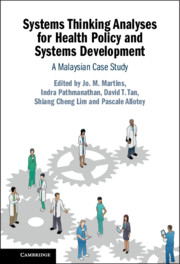Health and development are inextricably linked. Countries require robust health systems to enable the delivery of quality health services and to ensure access to health as a public good while both balancing national budgets and providing protection against individual catastrophic spending on healthcare. Getting this balance right remains a problem for most countries, particularly in resource-constrained settings. Training resources available to address the development of health systems often take a narrow, singular, linear approach which fails to engage with the intersections and interactions of health with a multitude of systems and determinants. Although there is general guidance and technical support for countries from multilateral agencies like the World Health Organization and the World Bank, the importance of local contexts in building and strengthening health systems adds a layer of complexity to the task. The publications by de Savigny and colleagues on systems thinking for health systems strengthening and applied systems thinking for health systems research (de Savigny and Taghreed, 2009; de Savigny, Blanchet and Taghreed, 2017) provide the analytical approach and the tools to use systems thinking to understand the multiplicity of factors involved. However, texts seldom demonstrate how the systems thinking approach has been applied across an entire health system.
This book is timely for several reasons. Health systems, particularly in resource-constrained settings, are progressing from approaches driven largely by disease-related vertical programmes to a greater focus on strengthening the foundations of the system with people at the centre. Simultaneously, lower-income countries are reclaiming control of priority-setting for health, all with the imperative to achieve Universal Health Coverage – to ensure that access to quality care is available to and accessible by all. The scholarship for health systems strengthening is increasingly robust, with a growing body of evidence to help inform decisions. However, the decisions also need to be grounded in the historical, political, economic, and social context of the country. Even with new ideas and great will, implementation needs to draw on an understanding of the past to forge the path for the future. And this is the approach taken by this book, skilfully edited by Martins et al.
This book presents a case study of a country – Malaysia – that is transitioning from low income (1957) to the cusp of high income as one of the more successful countries in South East Asia. The case is presented from the perspective of health system development. Systems thinking feedback loops are applied throughout the narrative of the different health systems building blocks as a model for understanding feedback pathways. The approach is engaging and works as a mechanism for critical analysis, as well as drawing out the relevant learning points and contexts that allow for the lessons to be generalised.
The authors highlight the social functions of health systems and the political economy underlying decision making; these are often ignored in more theoretical texts. The engagement of authors and other stakeholders who were historically involved in decisions provides a biographical perspective – again, a refreshing and reflective approach that does not detract from the rigour of the analysis.
The book is comprehensive, covering from traditional medicines to digital technology; from contact tracing of tuberculosis and field epidemiology in remote hamlets to the establishment of the national institutes of health; from training of the human resources for health to health technology assessment; and management of communicable and non-communicable diseases. A reading of this text provides a good background to understanding the ability of the health system to manage the 2020 COVID-19 outbreak – and the final two chapters present an excellent analysis of both the value of the systems thinking approach to the analysis and the transferrable lessons for other countries and the settings of both successes and pitfalls.
Personally, and as Executive Director of the Alliance for Health Policy and Systems Research, this text gives me immense pleasure and pride, because this is the first application of systems thinking at the national level since the Alliance launched the Systems Thinking Report in 2009. I hope this book will be useful and used by the policy, research, and teaching communities in other parts of the world as a real-life example of systems thinking.

